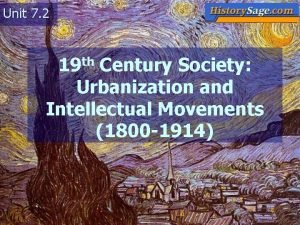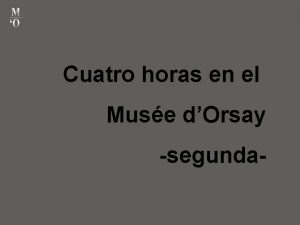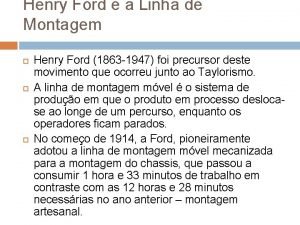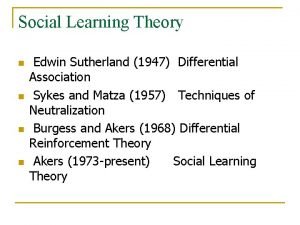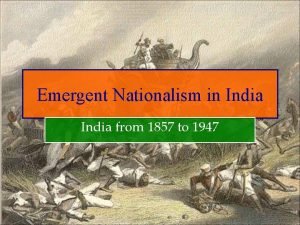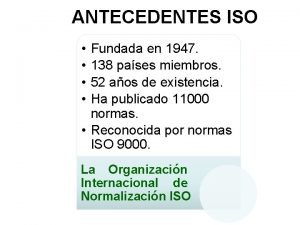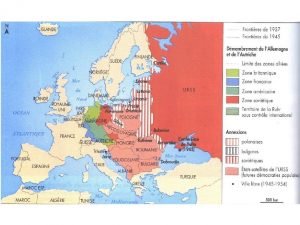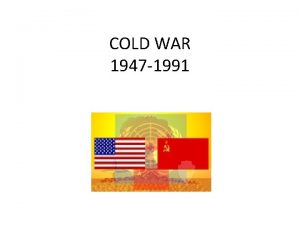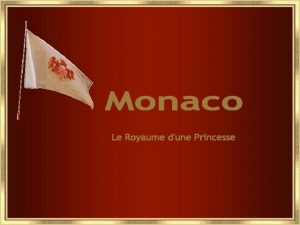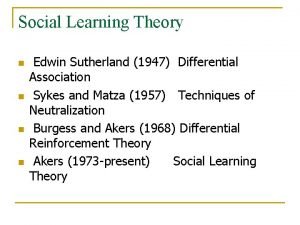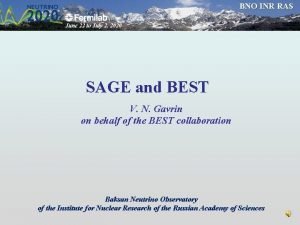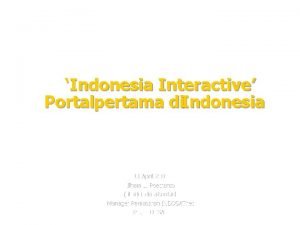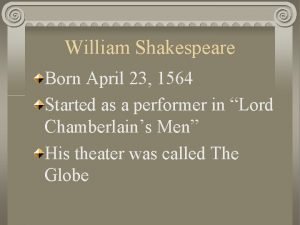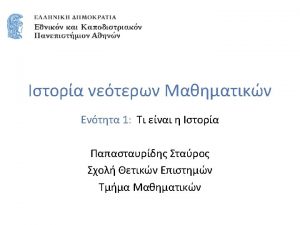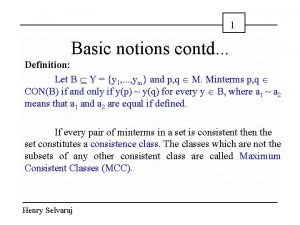Henry Ford July 30 1863 April 7 1947











































































































- Slides: 107







Henry Ford (July 30, 1863 – April 7, 1947) • "History is more or less bunk. It's tradition. We don't want tradition. We want to live in the present, and the only history that is worth a tinker's damn is the history that we make today. " (Chicago Tribune, 1916). • Λαική Κουλτούρα • Λειτουργία της Επιστήμης Τι είναι η Ιστορία 7

Henry Ford και Ναζί • At a ceremony in Dearborn, Michigan, Henry Ford is presented with the Grand Cross of the Supreme Order of the German Eagle on his 75 th birthday. Henry Ford is the first American recipient of this, an honor created a year earlier by Adolf Hitler. • This is the highest honor Nazi Germany could give to any foreigner and represents Adolf Hitler’s personal admiration and indebtedness to Henry Ford. The presentation is made by Karl Kapp, German consul in Cleveland, and Fritz Heller, German consular representative in Detroit. Ford is the only American mentioned in Hitler’s book “Mein Kampf”. Τι είναι η Ιστορία Εικόνα 1. 8

Napoleon Bonaparte • History is a set of lies that people have agreed upon. • Lies? Τι είναι η Ιστορία 9

Napoleon Crossing the Alps • Also known as Napoleon at the Saint-Bernard Pass or Bonaparte Crossing the Alps, is the title given to the five versions of an oil on canvas equestrian portrait of Napoleon Bonaparte painted by the French artist Jacques. Louis David between 1801 and 1805. Initially commissioned by the king of Spain, the composition shows a strongly idealized view of the real crossing that Napoleon and his army made across the Alps through the Great St. Bernard Pass in May 1800. Εικόνα 2. Τι είναι η Ιστορία 10




Ραμσής ο Β’ (4 από 4) • Ήταν ο τρίτος Φαραώ της 19ης δυναστείας και ο ισχυρότερος όλων των Αιγυπτίων ηγεμόνων Τι είναι η Ιστορία • Was the third pharaoh of the Nineteenth Dynasty of Egypt. He is often regarded as the greatest, most celebrated, and most powerful pharaoh of the Egyptian Empire. [7] 14



Ramesses II, Battle of Kadesh • The Battle of Kadesh in his fifth regnal year was the climactic engagement in a campaign that Ramesses fought in Syria, against the resurgent Hittite forces of Muwatallis. The pharaoh wanted a victory at Kadesh both to expand Egypt's frontiers into Syria and to emulate his father Seti I's triumphal entry into the city just a decade or so earlier. . • Ramesses's forces were caught in a Hittite ambush and outnumbered at Kadesh when they counterattacked and routed the Hittites, whose survivors abandoned their chariots and swam the Orontes river back to the safe city walls. [22] Ramesses, logistically unable to sustain a long siege, returned to Egypt. [23] [24] Τι είναι η Ιστορία 17

Kadesh • The Battle of Kadesh (also Qadesh) took place between the forces of the Egyptian Empire under Ramesses II and the Hittite Empire under Muwatalli II at the city of Kadesh on the Orontes River, in what is now Syria. [10] • The battle is generally dated to 1274 BC, [11] and is the earliest battle in recorded history for which details of tactics and formations are known. [12] It was probably the largest chariot battle ever fought, involving perhaps 5, 000– 6, 000 chariots. [13] Τι είναι η Ιστορία 18

Battle of Kadesh • Disputes over the outcome • There is no consensus about the outcome or what took place, with views ranging from an Egyptian victory, a draw, and, according to the view of Iranian Egyptologist Mehdi Yarahmadi, [31] an Egyptian defeat (with the Egyptian accounts simply propaganda). [32] • Έκβαση Συνθήκη ειρήνης Τακτική: αιγυπτιακή πύρρειος νίκη Στρατηγική: νίκη των Χετταίων (Η Αυτοκρατορία των Χετταίων επεκτάθηκε προς νότο) Τι είναι η Ιστορία 19


Ιστορία και «Ιστορία» (1 από 2) • For example, on the temple walls of Luxor the near catastrophe was turned into an act of heroism: • His majesty slaughtered the armed forces of the Hittites in their entirety, their great rulers and all their brothers. . . their infantry and chariot troops fell prostrate, one on top of the other. His majesty killed them. . . and they lay stretched out in front of their horses. But his majesty was alone, nobody accompanied him. . . • http: //schools-wikipedia. org/wp/r/Ramesses_II. htm Τι είναι η Ιστορία 21

Ιστορία και «Ιστορία» (2 από 2) http: //www. touregypt. net/featurestories/kadesh. htm : • ". . . No officer was with me, no charioteer, no soldier of the army, no shield-bearer. . . "[29] • ". . . I was before them like Set in his moment. I found the mass of chariots in whose midst I was, scattering them before my horses. . . « • "None of you was there. . . None rose to lend me his hand in my fight. . . None of you came later to tell the story of his heroic deeds in Egypt. . . The foreigners who saw me, praise my name to the end of all lands where I was not known. . . Since ancient times a man was honored for his fighting abilities, but I will not reward any of you, as you have abandoned me when I was alone fighting my enemies. " Read more: http: //www. touregypt. net/featurestories/kadesh. htm#ixzz 3 RXy. Ipw Op Τι είναι η Ιστορία 22

Ιστορική Μέθοδος • Ηρόδοτος • Herodotus (/hɨˈrɒdətəs/; Ancient Greek: Ἡρόδοτος Hēródotos) was an ancient Greek historian who was born in Halicarnassus, Caria (modern-day Bodrum, Turkey) and lived in the fifth century BC (c. 484– 425 BC). He has been called "The Father of History" (first conferred by Cicero), as well as "The Father of Lies" (first conferred by Voltaire). He was the first historian known to collect his materials systematically, test their accuracy to a certain extent, and arrange them in a well-constructed and vivid narrative. Τι είναι η Ιστορία 23

Father of Lies • http: //rationalwiki. org/wiki/Herodotus#cite_n ote-8 • Voltaire described Herodotus as both "the father of history" and the "father of lies", [9] and Hartog more recently also called him "The father of all liars". [10] Τι είναι η Ιστορία 24

By David Pipes, Loyola University New Orleans • Ακροτελεύτια παράγραφος του κειμένου Herodotus: Father of History, Father of Lies • Herodotus - Father of History and Father of Lies - What will the future think of him? If success is judged by the completion of stated goals, then truly, Herodotus succeeded with his History. In any event, when one takes into consideration the struggles Herodotus and his marvelous tale endured both before and after his death, there can be no doubt that he has earned his place at the vanguard of history. Τι είναι η Ιστορία 25









A Nietzsche Compendium, Twilight of the Idols, trans. Anthony M. Ludovici (1 από 2) • "My recreation, my predilection, my cure, after all Platonism, has always been Thucydides and perhaps Machiavelli's principe are most closely related to me owing to the absolute determination which they show of refusing to deceive themselves and of seeing reason in reality – not in "rationality, " and still less in "morality. « • There is no more radical cure than Thucydides for the lamentably rose-coloured idealisation of the Greeks. . . His writings must be carefully studied line by line, and his unuttered thoughts must be read as distinctly as what he actually says. Τι είναι η Ιστορία 34

A Nietzsche Compendium, Twilight of the Idols, trans. Anthony M. Ludovici (2 από 2) • There are few thinkers so rich in unuttered thoughts. . . Thucydides is the great summing up, the final manifestation of that strong, severe positivism which lay in the instincts of the ancient Hellene. • After all, it is courage in the face of reality that distinguishes such natures as Thucydides from Plato: Plato is a coward in the face of reality – consequently he takes refuge in the ideal: Thucydides is a master of himself – consequently he is able to master life. ” Τι είναι η Ιστορία 35








Ιταλική Αναγέννηση • Εξίσωση 3ου – 4ου βαθμού • Gerolamo Cardano (September 1501 – 21 September 1576) , • Niccolò Fontana Tartaglia (1499/1500, Brescia – 13 December 1557, Venice), • Lodovico Ferrari (2 February 1522 – 5 October 1565) Τι είναι η Ιστορία 43

Ιταλία: Μαθηματικά – Φυσική • Bonaventura Francesco Cavalieri (1598 – 1647) • Rafael Bombelli (baptised 1526; died 1572[a]) • Galileo Galilei (1564 – 1642) • Evangelista Torricelli (1608– 1647) Τι είναι η Ιστορία 44


Italian mathematicians born near the end of the 19 th century • Italian School Of Algebraic Geometry, Luigi Cremona, Corrado Segre, Guido Castelnuovo Federigo Enriques , Giacomo Albanese, Giuseppe Veronese • Ulisse Dini (1845– 1918) • Guido Fubini (1879– 1943) • Leonida Tonelli (1885– 1946) • Giuseppe Peano (1858— 1932) • Enrico Betti (21 October 1823 – 11 August 1892) • Eugenio Beltrami (1835 -1899) Italy • Gregorio Ricci-Curbastro (12 January 1853 – 6 August 1925) • Tullio Levi-Civita, FRS[1][2] (1873 – 1941) Τι είναι η Ιστορία 46

Γαλλία – Γερμανία (1 από 2) Greatest Mathematicians born between 1700 and 1799 A. D. : • • • Johann Carl Friedrich Gauss (1777 -1855) Germany August Ferdinand Möbius (1790 -1868) Germany Alexis Claude Clairaut (1713 -1765) France Jean le Rond d' Alembert (1717 -1783) France Joseph-Louis (Comte de) Lagrange (1736 -1813) (? )Italy Gaspard Monge (Comte de Péluse) (1746 -1818) France Τι είναι η Ιστορία 47

Γαλλία – Γερμανία (2 από 2) Greatest Mathematicians born between 1700 and 1799 A. D. : • • Pierre-Simon (Marquis de) Laplace (1749 -1827) France Adrien Marie Legendre (1752 -1833) France Jean Baptiste Joseph Fourier (1768 -1830) France Siméon Denis Poisson (1781 -1840) France Jean-Victor Poncelet (1788 -1867) France Augustin-Louis Cauchy (1789 -1857) France Michel Floréal Chasles (1793 -1880) France Τι είναι η Ιστορία 48

Σύγκριση Γαλλίας – Γερμανίας (1 από 2) Σημαντικοί Μαθηματικοί γεννηθέντες μεταξύ 1800 -1869 • Γερμανοί: – Julius Plücker (1801 -1868) – Carl G. J. Jacobi (1804 -1851) – Johann Peter Gustav Lejeune Dirichlet (1805 -1859) – Hermann Günter Grassmann (1809 -1877) – Ernst Eduard Kummer (18101893) Τι είναι η Ιστορία • Γάλλοι: – Joseph Liouville (1809 -1882) France – Évariste Galois (1811 -1832) France – Charles Hermite (1822 -1901) France 49

Σύγκριση Γαλλίας – Γερμανίας (2 από 2) Σημαντικοί Μαθηματικοί γεννηθέντες μεταξύ 1800 -1869 • Γερμανοί: – Karl Wilhelm Theodor Weierstrass (1815 -1897) – Ferdinand Gotthold Max Eisenstein (1823 -1852) – Leopold Kronecker (18231891) – Georg Friedrich Bernhard Riemann (1826 -1866) – Julius Wilhelm Richard Dedekind (1831 -1916) Τι είναι η Ιστορία • Γάλλοι: – Marie Ennemond Camille Jordan (1838 -1921) France – Jean Gaston Darboux (18421917) France 50

Σύγκριση Γαλλίας – Γερμανίας (3 από 3) Σημαντικοί Μαθηματικοί γεννηθέντες μεταξύ 1800 -1869 • Γερμανοί: • Γάλλοι: – Rudolf Friedrich Alfred – Jules Henri Poincaré (1854 Clebsch (1833 -1872) 1912) France – Georg Cantor (1845 -1918) Russia – Friedrich Ludwig Gottlob Frege (1848 -1925) – Ferdinand Georg Frobenius (1849 -1917) – Christian Felix Klein (18491925) Πηγή: http: //fabpedigree. com/james/grmatm 5. htm Τι είναι η Ιστορία 51

Interbellum περίοδος, Πολωνία Lwów school of mathematics • • Stefan Banach Feliks Barański Władysław Orlicz Stanisław Saks Hugo Steinhaus Stanisław Mazur Stanisław Ulam Τι είναι η Ιστορία • • Juliusz Schauder Mark Kac Antoni Łomnicki Stefan Kaczmarz Herman Auerbach Włodzimierz Stożek Stanisław Ruziewicz 52

Warsaw School (Μathematics) (1 από 2) Notable members of the Warsaw School of Mathematics have included: • • • Wacław Sierpiński Kazimierz Kuratowski Edward Marczewski Bronisław Knaster Zygmunt Janiszewski Τι είναι η Ιστορία • • • Stefan Mazurkiewicz Stanisław Saks Karol Borsuk Roman Sikorski Nachman Aronszajn Samuel Eilenberg 53

Warsaw School (Μathematics) (2 από 2) Lwów-Warsaw School of Logic, working at Warsaw, have included: • Stanisław Leśniewski • Adolf Lindenbaum • Alfred Tarski • Jan Łukasiewicz • Andrzej Mostowski Τι είναι η Ιστορία Fourier analysis has been advanced at Warsaw by: • Aleksander Rajchman • Antoni Zygmund • Józef Marcinkiewicz • Otton M. Nikodym • Jerzy Spława-Neyman 54

Polish School of Mathematics, Interbellum years • Wikipedia. It has been debated what stimulated the exceptional efflorescence of mathematics in Poland after World War I. • Important preparatory work had been done by the Polish "Positivists" following the disastrous January 1863 Uprising. The Positivists extolled science and technology, and popularized slogans of "organic work" and "building from the foundations“. • In the 20 th century, mathematics was a field of endeavor that could be successfully pursued even with the limited resources that Poland commanded in the interbellum period. Τι είναι η Ιστορία 55

Third Partition of Poland • The Third Partition of Poland (1795) was the last in a series of the Partitions of Poland of the Polish–Lithuanian Commonwealth • Among Prussia, the Austrian Empire, and the Russian Empire which effectively ended Polish –Lithuanian national sovereign Τι είναι η Ιστορία 56





Ηρόδοτος – Μύθοι – Ιστορία (2 από 2) • He went to tell the Delphians of this miracle ; But when the foreigners came with all speed near to the temple of Athene Pronaea, they were visited by miracles yet greater than the aforesaid. • Marvelous indeed it is, that weapons of war should of their own motion appear lying outside before the shrine ; But the visitation which followed upon that was more wondrous than aught else ever seen. • For when the foreigners where near in their coining to the temple of Athene Pronaea, there were they smitten by thunderbolts from heaven, and two peaks brake off from Parnassus and came rushing among them with a mighty noise and overwhelmed many of them ; and from the temple of Athene there was heard a shout and a cry of triumph. Τι είναι η Ιστορία 61







Αισχύλος, Οι Πέρσες, στίχος 336 (2 από 2) • Were numbers all, be well assured the barbarians would have gained the victory with their fleet. For the whole number of the ships of Hellas amounted to ten times thirty, and, apart from these, there was a chosen squadron of ten. Τι είναι η Ιστορία 68

Ηρόδοτος, 8 -82 • Tenos were engraved on the tripod at Delphi • among those that had vanquished the foreigner. • With this ship that deserted to Salamis and the • Lemnian which had already deserted to Αrtemisium, • the Greek fleet, which had fallen short by two of • three hundred and eighty, now attained to that full number. Τι είναι η Ιστορία 69



1846 review of Grote’s History of Greece, by John Stuart Mill • John Stuart Mill (1806 -1873), was a British philosopher, political economist and civil servant. He was an influential contributor to social theory, political theory and political economy, 1806. • Here is Mill’s sentence in context: “The interest of Grecian history is unexhausted and inexhaustible. As a mere story, hardly any other portion of authentic history can compete with it. Its characters, its situations, the very march of its incidents, are epic. It is an heroic poem, of which the personages are peoples. It is also, of all histories of which we know so much, the most abounding in consequences to us who now live. • The true ancestors of the European nations (it has been well said) are not those from whose blood they are sprung, but those from whom they derive the richest portion of their inheritance. The battle of Marathon, even as an event in English history, is more important than the battle of Hastings. If the issue of that day had been different, the Britons and the Saxons might still have been wandering in the woods. Τι είναι η Ιστορία 72


Ανυπαρξία Μαθηματικών (1 από 2) • Ρωμαϊκή Αυτοκρατορία • Graecia capta ferum victorem cepit et artes intulit agresti Latio. • Greece, the captive, made her savage victor captive, and brought the arts into rustic Latium. • Horace, Epistles 2. 1. 156, in Horace : Satires, Epistles, and Ars Poetica (1929) edited and translated by H. R. Fairclough, p. 408 • Quintus Horatius Flaccus (65 BC – 8 BC) Τι είναι η Ιστορία 74

Βιργίλιος, Αινείας • Aeneid 6. 847 -853 • Excudent alii spirantia mollius aera, • credo equidem, vivos ducent de marmore voltus, • orabunt causas melius, caelique meatus • describent radio, et surgentia sidera dicent: 850 • tu regere imperio populos, Romane, memento; • hae tibi erunt artes; pacisque imponere morem, • parcere subiectis, et debellare superbos. Τι είναι η Ιστορία • Aeneas 6. 847 -853 • Others will forge breathing bronzes more smoothly • (I believe it at any rate), and draw forth living features from marble. • They will plead law-suits better and trace the movements • Of the sky with a rod and describe the rising stars. • You, O Roman, govern the nations with your power- remember this! • These will be your arts – to impose the ways of peace, • To show mercy to the conquered and to subdue the proud. 75

Gaius Julius Caesar (100 BC – 44 BC) • Caesar's last words are not known with certainty and are a contested subject among scholars and historians alike. The phrase, Et tu, Brute? , maintains its familiarity from William Shakespeare's play Julius Caesar (1599), where it actually forms the first half of a macaronic line: "Et tu, Brute? Then fall, Caesar!"[4] Shakespeare in turn was making use of a phrase already in common use in his time: it appears for example, in Richard Eedes's Latin play Caesar Interfectus of 1582 and The True Tragedie of Richarde Duke of Yorke &cof 1595, the earliest printed version of Henry VI, Part 3. [5] • The phrase follows in the tradition of the Roman historian Suetonius, who reports that others have claimed Caesar's last words were the Greek phrase "καὶ σὺ, τέκνον; ", transliterated as "Kai su, teknon? ". The phrase means "You too, child? " or "You too, young man? " but has commonly been interpreted as meaning "You too, my child? " (Tu quoque, fili mi in Latin) and taken as an indication that Brutus was Caesar's illegitimate son. Τι είναι η Ιστορία 76

Alea iacta est, Ἀνεῤῥίφθω κύβος • Alea iacta est ("The die is cast") is a Latin phrase attributed by Suetonius (as iacta alea est [ˈjakta ˈaːlea est]) to Julius Caesar on January 10, 49 BC as he led his army across the River Rubicon in Northern Italy. With this step, he entered Italy at the head of his army in defiance of the Senate and began his long civil war against Pompey and the. Optimates. The phrase is still used today in Italy (Il dado è tratto) to mean that events have passed a point of no return, that something inevitably will happen. • Θεωρείται ότι η φράση ανήκει αρχικά στον Μένανδρο, αγαπημένο ποιητή του Καίσαρα, και εμφανίζεται σε ένα στίχο του στην “Ἀρρηφόρῳ” (Δειπνοσοφισταί, 13 -8). Ο Πλούταρχος αναφέρει, για το συγκεκριμένο περιστατικό: "Ἑλληνιστὶ πρὸς τοὺς παρόντας ἐκβοήσας, «Ἀνεῤῥίφθω κύβος» , διεβίβαζε τὸν στρατόν. " (προστακτική παρακειμένου σε γ΄ πρόσωπο, του ρήματος ἀνέῤῥιμμαι - ἀναῤῥίπτομαι). Τι είναι η Ιστορία 77


Fields Medals by affiliation (1 από 2) • Princeton University, 8 • Institut des Hautes Études Scientifiques, 6 • University of Paris, 6 • Institute for Advanced Study, 5 • Harvard University, 3 • University of California, Berkeley, 3 • University of Cambridge, 3 • Massachusetts Institute of Technology, 2 • Oxford University, 2 • Stanford University, 2 Τι είναι η Ιστορία • University of California San Diego, 2 • CNRS, 1 • Hebrew University of Jerusalem, 1 • Institut Henri Poincaré, 1 • Instituto Nacional de Matemática Pura e Aplicada, 1 • Kyoto University, 1 • Moscow State University, 1 • Rutgers University, 1 • University College London, 1 79

Fields Medals by affiliation (2 από 2) • University of California, Los Angeles, 1 • University of Geneva, 1 • University of Helsinki, 1 • University of Kharkiv, 1 • University of Nancy, 1 • University of Pisa, 1 • University of Stockholm, 1 Τι είναι η Ιστορία • University of Strasbourg, 1 • University of Warwick, 1 • University of Tokyo, 1 • École Normale Supérieure de Lyon, 1 • None (independent researcher), 1 80


Fields, κατά έτος, Βραβευθέντα, Ίδρυμα, Τρέχον Ίδρυμα (2014) (1 από 3) • 1936, Lars Ahlfors, University of Helsinki, Finland, Harvard University, US[13][14] • 1936, Jesse Douglas, Massachusetts Institute of Technology, US, City College of New York, • 1950, Laurent Schwartz, University of Nancy, France, University of Paris VII, France[17][18] • 1950, Atle Selberg, Institute for Advanced Study, US, Institute for Advanced Study, US[19] • 1954, Kunihiko Kodaira, University of Tokyo[20] and Princeton University[20], University of Tokyo, • 1954, Jean-Pierre Serre, University of Nancy, France, Collège de France, France[22][23] Τι είναι η Ιστορία 82

Fields, κατά έτος, Βραβευθέντα, Ίδρυμα, Τρέχον Ίδρυμα (2014) (2 από 3) • 1958, Klaus Roth, University College London, UK, Imperial College London, UK[24] • 1958, René Thom, University of Strasbourg, France, Institut des Hautes Études Scientifiques, • 1962, Lars Hörmander, University of Stockholm, Sweden, Lund University, Sweden[26] • 1962, John Milnor, Princeton University, US, Stony Brook University, US[27] • 1966, Michael Atiyah, University of Oxford, UK, University of Edinburgh, UK[28] • 1966, Paul Joseph Cohen, Stanford University, US[29] Τι είναι η Ιστορία 83

Fields, κατά έτος, Βραβευθέντα, Ίδρυμα, Τρέχον Ίδρυμα (2014) (3 από 3) • 1966, Alexander Grothendieck, ΙHS, CNRS, France[30] • 1966, Stephen Smale, University of California, Berkeley, US, City University of Hong Kong, • 1970, Alan Baker, University of Cambridge, UK, Trinity College, Cambridge, • 1970, Heisuke Hironaka, Harvard University, US, Kyoto University, Japan[33][34] • 1970, John G. Thompson, University of Cambridge, UK, University of Cambridge, University of Florida, • 1970, Sergei Novikov, Moscow State University, USSR, Steklov Mathematical Institute, Russia Τι είναι η Ιστορία 84


Hideki Yukawa (1907 -1981) • Was a Japanese theoretical physicist and the first Japanese Nobel laureate. • 1935, Θεωρητική πρόβλεψη των Μεσονίων • 1949, Nobel Prize, Καθηγητής Columbia Τι είναι η Ιστορία 86





Δυτικές Χώρες • ITALIE, ITA, • LUXEMBURG, LUX, • GERMANY, GER, • GERMAN DEMOCRATIC REPUBLC, GDR • FRANCE, FRA, • UNITED KINGDOM, UNK, • SWITZERLAND, SUI, • BELGIUM, BEL, • DENMARK, DEN, • SWEDEN, SWE, • NORWAY, NOR, • FINLAND, FIN Τι είναι η Ιστορία 91

Αμερική • Canada, Can • Macknamara : Jews, Chinese-japanese, (? ) Irish • The Fog Of War: Eleven Lessons From The Life Of Robert S. Mcnamara (2003) • IMDB 8, 2 Your Rating, From 17. 621 Users • OSCAR 2004 Τι είναι η Ιστορία 92

Χώρες Άπω Ανατολής • Japan, Jpn, • China, Chn, • Korea, Kor, • Singapore, Sgr, • Vietnam, Vnm, • Singapore, Sgp Τι είναι η Ιστορία 93

Βαλκάνια • Ελλάς, Hel, • Turkey, Tur, • Cyprus, Cyp, • Bulgaria, Bgr, • Romania, Rou, • Serbia, Srb, • Yugoslavia, Yug Τι είναι η Ιστορία 94

Διάφορα • Iran, Irn • Maryam Mirzakhani was born in 1977 in Tehran, Iran. She went to high school in Tehran at Farzanegan, National Organization for Development of Exceptional Talents (NODET). She competed and was recognized internationally for her math skills, receiving gold medals at both the 1994 International Mathematical Olympiad (Hong Kong) and the 1995 International Mathematical Olympiad (Toronto), [14] where she was the first Iranian student to finish with a perfect score. [14][15][16] Τι είναι η Ιστορία 95


Ορθολογισμός (Rationalism-reason) – Νομοτέλειες – Ηρόδοτος – Βολταίρος (1 από 2) • History is much more than just a chronological flow of dates and events; and it is not merely the biography of kings and famous personalities. It is instead the investigation of the past intended in ample sense; and it comprehends the study of culture, thoughts, habits, political institutions and many other aspects of society. • This concept was very clear to Herodotus and Voltaire, two historians that, although lived a totally different period and contest, share some affinities in the way in which they write about the past. They both were interested in the cultural history, in the usefulness of history in the comprehension of the present and in the importance of on field research. • Notwithstanding, they investigate the days of yore with different purposes; Voltaire with the aim of supporting his political and philosophical point of view; Herodotus just for the sake of an anthropological and ethnographical accounting. Τι είναι η Ιστορία 97

Ορθολογισμός (Rationalism-reason) – Νομοτέλειες – Ηρόδοτος – Βολταίρος (2 από 2) • Both Herodotus and Voltaire examine the past in order to understand the present issues and dynamics. Nonetheless the reasons that drive them to do so are quite different. The aim of Voltaire is to use the previous experiences of other civilizations so that to understand whether their scenarios can be reproducible in other environments. This is wholly clear in its analysis of the English Parliament, when he looks over the motivations why England was able to establish a bicameral parliament within a kingdom. He is interested in that because of his political and philosophical thoughts; he was in fact a strong adherent of the Enlightenment intellectual movement. • (? ) I disapprove of what you say Πηγή: http: //webspier. com/essay/428189 Τι είναι η Ιστορία 98








Σημείωμα Χρήσης Έργων Τρίτων (1/2) Το Έργο αυτό κάνει χρήση των ακόλουθων έργων: Εικόνες/Σχήματα/Διαγράμματα/Φωτογραφίες Εικόνα 1: Henry Ford receiving the Grand Cross of the German Eagle from Nazi officials, 1938. Free to share. http: //rarehistoricalphotos. com/henry-ford-receivinggrand-cross-german-eagle-nazi-officials-1938/ Εικόνα 2: Jacques Louis David - Bonaparte. Licensed under Public Domain via Wikimedia Commons https: //commons. wikimedia. org/wiki/File: Jacques_Louis_David__Bonaparte_franchissant_le_Grand_Saint-Bernard, _20_mai_1800. jpg? uselang=el. Εικόνα 3: Ramses II charging Nubians. "Ramses II charging Nubians" by Roderick Dailey - Own work. Licensed under CC BY-SA 3. 0 via Wikimedia Commons, https: //commons. wikimedia. org/wiki/File: Ramses_II_charging_Nubians. jpg? uselan g=el. http: //commons. wikimedia. org/wiki/ Τι είναι η Ιστορία 106

Σημείωμα Χρήσης Έργων Τρίτων (2/2) Το Έργο αυτό κάνει χρήση των ακόλουθων έργων: Εικόνες/Σχήματα/Διαγράμματα/Φωτογραφίες Εικόνα 4: Ramesses II storming the Hittite fortress of Dapur. Licensed under Public Domain via Wikimedia Commons - https: //commons. wikimedia. org/wiki/File: Ramses_IIs_seger_%C 3%B 6 ver_Chetafolk et_och_stormningen_av_Dapur, _Nordisk_familjebok. png#/media/File: Ramses_IIs_ seger_%C 3%B 6 ver_Chetafolket_och_stormningen_av_Dapur, _Nordisk_familjebok. png Εικόνα 5: The statue of Herodotus in Bodrum. Licensed under Public Domain via Wikimedia Commons - https: //commons. wikimedia. org/wiki/File: Herodotusstatue. JPG#/media/File: Herod otusstatue. JPG Τι είναι η Ιστορία 107
 July 1-4 1863
July 1-4 1863 Jan feb march april may june july
Jan feb march april may june july April ford incentives
April ford incentives Nov 19 1863
Nov 19 1863 The stonebreakers
The stonebreakers Olympia, 1863
Olympia, 1863 2nd industrial revolution timeline
2nd industrial revolution timeline Homestead act of 1863
Homestead act of 1863 The three uses of money
The three uses of money Olympia gauguin
Olympia gauguin Constitucion de 1863
Constitucion de 1863 Manet, olympia, 1863
Manet, olympia, 1863 Edouard manet olympia 1863
Edouard manet olympia 1863 Hjälper sedan 1863
Hjälper sedan 1863 Impressionism 1867 to 1886
Impressionism 1867 to 1886 Jeff wall morning cleaning
Jeff wall morning cleaning Cisco ip phone 7965 voicemail
Cisco ip phone 7965 voicemail Henry ford manažment
Henry ford manažment John logie baird discovered penicillin in 1929
John logie baird discovered penicillin in 1929 Teoria da administração científica resumo
Teoria da administração científica resumo Henry ford last words
Henry ford last words Henry fords life
Henry fords life Family guy satire analysis
Family guy satire analysis Henry ford principles of management
Henry ford principles of management Henry ford linha de montagem
Henry ford linha de montagem How did henry ford spend his money
How did henry ford spend his money Henry ford early college
Henry ford early college Henry ford paternalistic leadership
Henry ford paternalistic leadership Which innovation helped henry ford realize his vision?
Which innovation helped henry ford realize his vision? Presidential succession act of 1947 definition
Presidential succession act of 1947 definition Edwin sutherland theory
Edwin sutherland theory Revolt of 1857 to 1947
Revolt of 1857 to 1947 Objectives of industrial dispute act 1947
Objectives of industrial dispute act 1947 Tujuan perhumas
Tujuan perhumas Iso 1947
Iso 1947 1991-1947
1991-1947 Spain cold war
Spain cold war Kodeks norymberski eksperyment medyczny
Kodeks norymberski eksperyment medyczny First educational conference 1947
First educational conference 1947 Laulja 1920 1975
Laulja 1920 1975 Presidential succession act of 1947 definition
Presidential succession act of 1947 definition Father of social psychology
Father of social psychology 3 mars 1947
3 mars 1947 Why did truman believe greece needed aid
Why did truman believe greece needed aid Roman f saltna
Roman f saltna Objectives of industrial dispute act 1947
Objectives of industrial dispute act 1947 Merdeka talks
Merdeka talks Pengertian perang dingin
Pengertian perang dingin Miss kelly 1947
Miss kelly 1947 Pemerkasaan pendidikan kearah kesepaduan sosial
Pemerkasaan pendidikan kearah kesepaduan sosial What is labour law
What is labour law Nürnbergi kódex 1947
Nürnbergi kódex 1947 9/21/1947
9/21/1947 Avtor bambija felix
Avtor bambija felix Constitutional development in pakistan from 1947 to 1973
Constitutional development in pakistan from 1947 to 1973 Edwin sutherlands theory
Edwin sutherlands theory Girolata triptych
Girolata triptych Kodeks norymberski tekst
Kodeks norymberski tekst La maxima tension 1947 y 1953
La maxima tension 1947 y 1953 Harris burdick another place another time
Harris burdick another place another time Diferença entre eclipse lunar e solar
Diferença entre eclipse lunar e solar Super saturday tribal bingo july 4
Super saturday tribal bingo july 4 Sergei korolev
Sergei korolev On july 18 2001 a train carrying hazardous chemicals
On july 18 2001 a train carrying hazardous chemicals Sources nso frenchhowell neill mit technology...
Sources nso frenchhowell neill mit technology... July 26 1953
July 26 1953 June 22 to july 22
June 22 to july 22 Poppies in july
Poppies in july 2001 july 15
2001 july 15 July 14 1789
July 14 1789 Slidetodoc.com
Slidetodoc.com July 4 sermon
July 4 sermon May 1775
May 1775 Harris burdick uninvited guest
Harris burdick uninvited guest July 16 1776
July 16 1776 July 12 1776
July 12 1776 Gdje se rodio nikola tesla
Gdje se rodio nikola tesla 2003 july 17
2003 july 17 Malaga in july
Malaga in july June too soon july stand by
June too soon july stand by Poppies in july aoifes notes
Poppies in july aoifes notes Gcc july 2020
Gcc july 2020 The hot july sun beat relentlessly down
The hot july sun beat relentlessly down Ctdssmap payment schedule july 2021
Ctdssmap payment schedule july 2021 Monday 13th july
Monday 13th july July 30 2009 nasa
July 30 2009 nasa Why are leaf yeasts more plentiful in july
Why are leaf yeasts more plentiful in july July 2 1937 amelia earhart
July 2 1937 amelia earhart Miss cuba receives an invitation
Miss cuba receives an invitation Reformdjp/quiz/kuis-mini-april
Reformdjp/quiz/kuis-mini-april April 8th in history
April 8th in history April 26 1564
April 26 1564 January february march april
January february march april April art project
April art project Apod nasa calendar 26 april 2004
Apod nasa calendar 26 april 2004 April 23 1564
April 23 1564 Julie spengel established
Julie spengel established 11 april 2000
11 april 2000 Dreißig tage hat september
Dreißig tage hat september 3 april 2008
3 april 2008 1889 april 20
1889 april 20 April 23, 1564
April 23, 1564 April rustianto
April rustianto April 28 day of mourning
April 28 day of mourning 23 april shakespeare
23 april shakespeare Halloween is nearly here
Halloween is nearly here April fleming
April fleming 2003 april 20
2003 april 20




